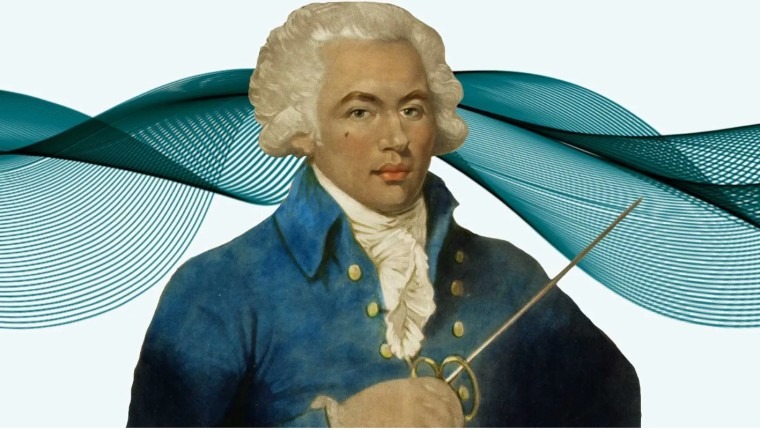By Kurt Loft
. . .
After 244 Years, Neglected Composer
Joseph Bologne Makes his TFO debut
. . .
April 1-2
St Pete and Tampa
Details here
. . .
“Who?’’ a friend asked. “Never heard of him.’’
That’s a typical reaction to any mention of Joseph Bologne, a little-known, rarely heard composer whose Symphony No. 2 launches an upcoming Florida Orchestra Masterworks program. Don’t feel bad if he doesn’t come up on your composer Rolodex, or if you don’t know a note from his symphonies, chamber pieces and operas.
But better late than not at all, as Bologne (also spelled Boulogne) makes his TFO debut 244 years after he wrote this brief three-movement piece in the sunny key of D major. It sounds, as you soon might agree, a bit like Haydn with a touch of Mozart, and flows easily over 10 fleeting minutes.
We posed the question to Bill Barclay, artistic director of the Concert Theater Works in Boston, who wrote a musical play about Bologne called The Chevalier.
The show − which premiered at the 2019 Tanglewood Festival − continues to tour around the country, focusing not just on a remarkable historical character but on the issue of racial equality in the arts. Proceeds from performances help pay the audition costs for young Black musicians.
The “injustice’’ is the prejudice that, historically, has been leveled against the composer. For all his talents, he faced racial persecution during his day, and his surviving scores continue to be ignored for reasons other than musical ones, many argue. The same goes for reference books that should otherwise include him. For instance, Bologne’s name is curiously missing from the six-volume Oxford History of Western Music.
“It is a remarkable fact that his music has survived two centuries of neglect caused by the systemic racism that permeates the notion of a Western canon,’’ Marcos Balter, a composer and professor of music composition at the University of California, San Diego, wrote in a 2020 New York Times essay.
Barclay argues that while it’s tempting to ascribe Bologne’s marginalization entirely to racism, the reality is more complex. Certainly, his race prevented him from holding prominent jobs – such as director of the Paris Opera – and from raising his own children. It also forced him into military service during the French Revolution, which truncated his career as a musician.
“All of these race-related issues have knock-on effects that are impossible to measure with regard to creativity and reception,’’ Barclay adds.
Bologne will have a big reception when the new Searchlight Pictures biographical drama, Chevalier, hits theaters April 21. Although the movie should bring attention to his life and work, it doesn’t help to refer to Bologne as “the Black Mozart.’’ The sobriquet isn’t a compliment, Balter says, because it “subjugates him to an arbitrary white standard and diminishes his truly unique place in Western classical music history.’’
During the French Revolution, he served as a colonel in the Légion St.-Georges, the first all-Black military regiment in Europe. His skills with an épée were legendary, and he became known as the finest swordsman in Europe. A man of strong moral posture, he withdrew his application for directorship of the Paris Opera after three singers protested working under a conductor of “mixed race.’’
Naturally gifted in music, he allegedly impressed such notables as Gossec and Leclair, and fraternized with Mozart, Gluck and Salieri. He composed and conducted chamber music and small-scale symphonies, and while much of his music has been lost – or marginalized – his surviving scores are poised models of classical-era form. A blind listening to his violin concertos could be mistaken for Haydn.
“He put together a suite from the opera, and it’s his greatest hit,’’ Barclay said about the symphony. “About 250 of his works remain in fragments or in full. There are probably hundreds more, if we could find them.’’
. . .
The Florida Orchestra performs
Joseph Bologne’s Symphony No. 2
and Beethoven’s Symphony No. 4
April 1 at 8 pm – Palladium Theater, St. Pete
April 2 at 2 pm – Straz Center, Tampa
floridaorchestra.org
Originally published in the Florida Orchestra Blog
. . .





